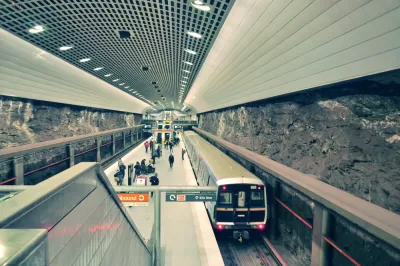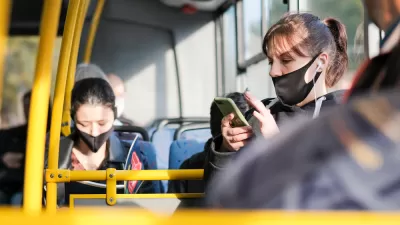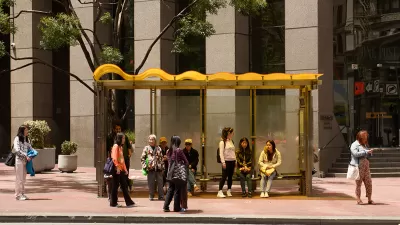After seeing dramatic cuts in service and ridership during the pandemic, transit agencies have a small window of opportunity to gain and retain regular passengers.

Because "we’re in the midst of an unprecedented period when millions of people are reevaluating their travel habits," writes David Zipper for Bloomberg CityLab, now is the time for transit agencies to radically rethink their strategies for attracting and retaining passengers. "If there is ever a time for local leaders to nudge residents toward transit and away from driving, this is it."
Zipper recommends several tactics for getting more people on buses and trains, such as offering free tickets, multimodal rewards, touchless payments, and emergency car rides for regular riders, a service implemented by several agencies before the pandemic. "These programs provide a kind of insurance if a rider urgently needs to travel at a time when bus or train service is unavailable (i.e., a mid-day trip to pick up a sick child at school, or a ride home after unexpectedly needing to work late). Ideally, they will enable more residents to opt for transit, secure in the knowledge that they can handle a sudden emergency without breaking their travel budget."
Zipper cautions, however, that while these small fixes can help make transit more accessible and more attractive, "[p]retty much everyone agrees that the key to sustained transit ridership growth is providing reliable, frequent and accessible service. Thankfully, an infusion of federal funds has now allowed many agencies to bring service back to pre-pandemic levels."
FULL STORY: 4 Ways Transit Can Lure Back Post-Covid Commuters

Planetizen Federal Action Tracker
A weekly monitor of how Trump’s orders and actions are impacting planners and planning in America.

San Francisco's School District Spent $105M To Build Affordable Housing for Teachers — And That's Just the Beginning
SFUSD joins a growing list of school districts using their land holdings to address housing affordability challenges faced by their own employees.

The Tiny, Adorable $7,000 Car Turning Japan Onto EVs
The single seat Mibot charges from a regular plug as quickly as an iPad, and is about half the price of an average EV.

Seattle's Plan for Adopting Driverless Cars
Equity, safety, accessibility and affordability are front of mind as the city prepares for robotaxis and other autonomous vehicles.

As Trump Phases Out FEMA, Is It Time to Flee the Floodplains?
With less federal funding available for disaster relief efforts, the need to relocate at-risk communities is more urgent than ever.

With Protected Lanes, 460% More People Commute by Bike
For those needing more ammo, more data proving what we already knew is here.
Urban Design for Planners 1: Software Tools
This six-course series explores essential urban design concepts using open source software and equips planners with the tools they need to participate fully in the urban design process.
Planning for Universal Design
Learn the tools for implementing Universal Design in planning regulations.
Smith Gee Studio
City of Charlotte
City of Camden Redevelopment Agency
City of Astoria
Transportation Research & Education Center (TREC) at Portland State University
US High Speed Rail Association
City of Camden Redevelopment Agency
Municipality of Princeton (NJ)





























